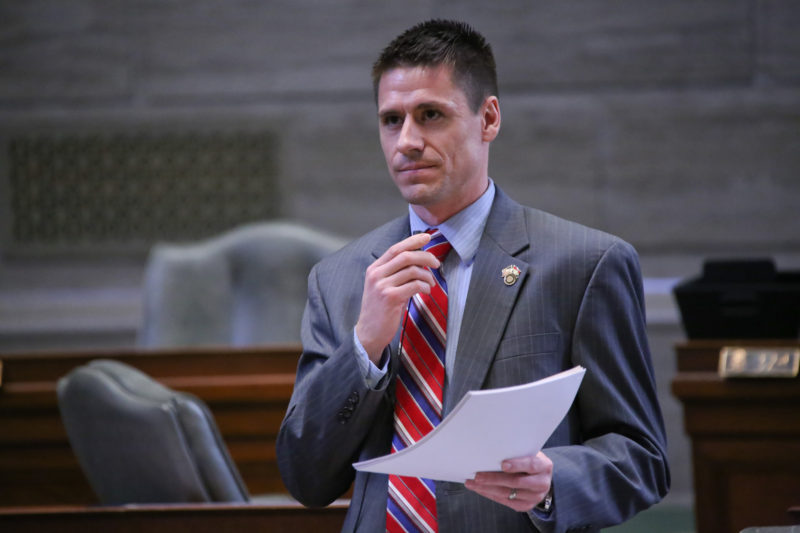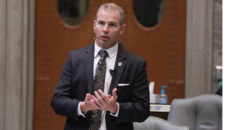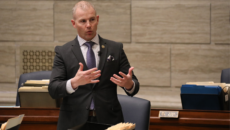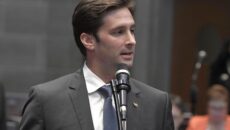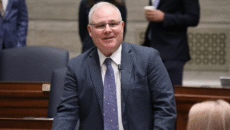JEFFERSON CITY, Mo. — The road to Fast Track is paved with education reform — at least according to some of the Senate’s more conservative members.
Republican state Sen. Andrew Koenig, a member of the Conservative Caucus, stalled a House bill granting scholarships for adults seeking further education related to high-demand jobs with a filibuster last week and attempted to attach education savings account (ESA) language to the bill.
HB 225, sponsored by state Rep. Kathy Swan and handled by state Sen. Gary Romine, would establish the Fast Track Workforce Incentive Grant program for Missourians who are at least 25-years-old and seeking additional education for high-demand jobs. It’s been deemed a priority for Gov. Mike Parson.
“The reality is HB 225 will not pass without ESAs on it,” Koenig said during the nearly four-hour debate.

A week later, his sentiments haven’t changed, placing him and other members of the Conservative Caucus at loggerheads with Romine, who is also a Republican. There’s still hope for Fast Track, multiple conservative senators have said — but without some sort of education reform measure attached to it, the impasse will likely be too great.
And Romine is remaining steadfast in his decision to keep Fast Track separated from charter school or ESA language.
“There’s a path forward, but it would require some kind of K-12 [education] reform — whether that’s charters or ESAs,” Koenig told The Missouri Times.
State Sen. Bill Eigel, also a Conservative Caucus member, said he wouldn’t call Fast Track discussions “dead” but couldn’t definitively say if the legislation will progress, especially without an education reform measure.
“We’ve already made that clear — if there’s some sort of education reform mechanism that’s attached to it, I think it’d probably pass through the Senate chamber pretty quick. And I think we’d be open to that discussion, whether it’s ESAs or charter schools,” Eigel told The Missouri Times.
“I think there is some willingness to give our governor the flexibility to try some different things in how he wants to see the government run. It’s an ongoing discussion. I wouldn’t say it’s a dead discussion by any means, but we haven’t found a path forward at this point,” he continued, adding he doesn’t necessarily see Fast Track advancing simply as a “standalone” bill.
“I wouldn’t say it’s a dead discussion by any means, but we haven’t found a path forward at this point.”
While not a member of the Conservative Caucus, Republican state Sen. Ed Emery, too, said the only way he could get on board with Fast Track would be to attach school choice reforms to it.
“I would be a no on Fast Track if it’s just by itself. But if it was combined with giving parents some choices in education, then I would support Fast Track along with the choice,” Emery told The Missouri Times.
Whether Romine and the band of senators pushing to couple education reform with Fast Track can come to an agreement is becoming less and less plausible with the legislature racing toward the session’s end on May 17. Romine said Tuesday afternoon he hasn’t had any “direct” conversations with the Conservative Caucus but would be willing for a line of communication to open.
Still, he remains resolute against attaching additional provisions to the workforce bill.
“As I’ve contended all along, we need to be dealing with policies and legislation based upon the merits and values of it, not leveraging one piece of legislation against another. I’d like to think at some point we’d get there, and we’d deal with the education reform for its merits, and we’d deal with Fast Track and any other piece of legislation for its merits,” Romine told The Missouri Times. “The best way to get things done, especially with this kind of time constraint, is [to] let each piece of legislation be dealt with based on the merits of the policy itself.”
“The best way to get things done, especially with this kind of time constraint, is [to] let each piece of legislation be dealt with based on the merits of the policy itself.”
Romine also said there’s a “need” and “desire” to pass Fast Track, contending it’s “an important part of the General Motors project the governor” is pushing. Officials from General Motors (GM) have recently met with Parson and other state leaders to discuss a potential $1 billion expansion at its Wentzville plant.
But Eigel — who represents the district next to St. Charles County, where Wentzville is located — pushed back on that notion Tuesday afternoon.
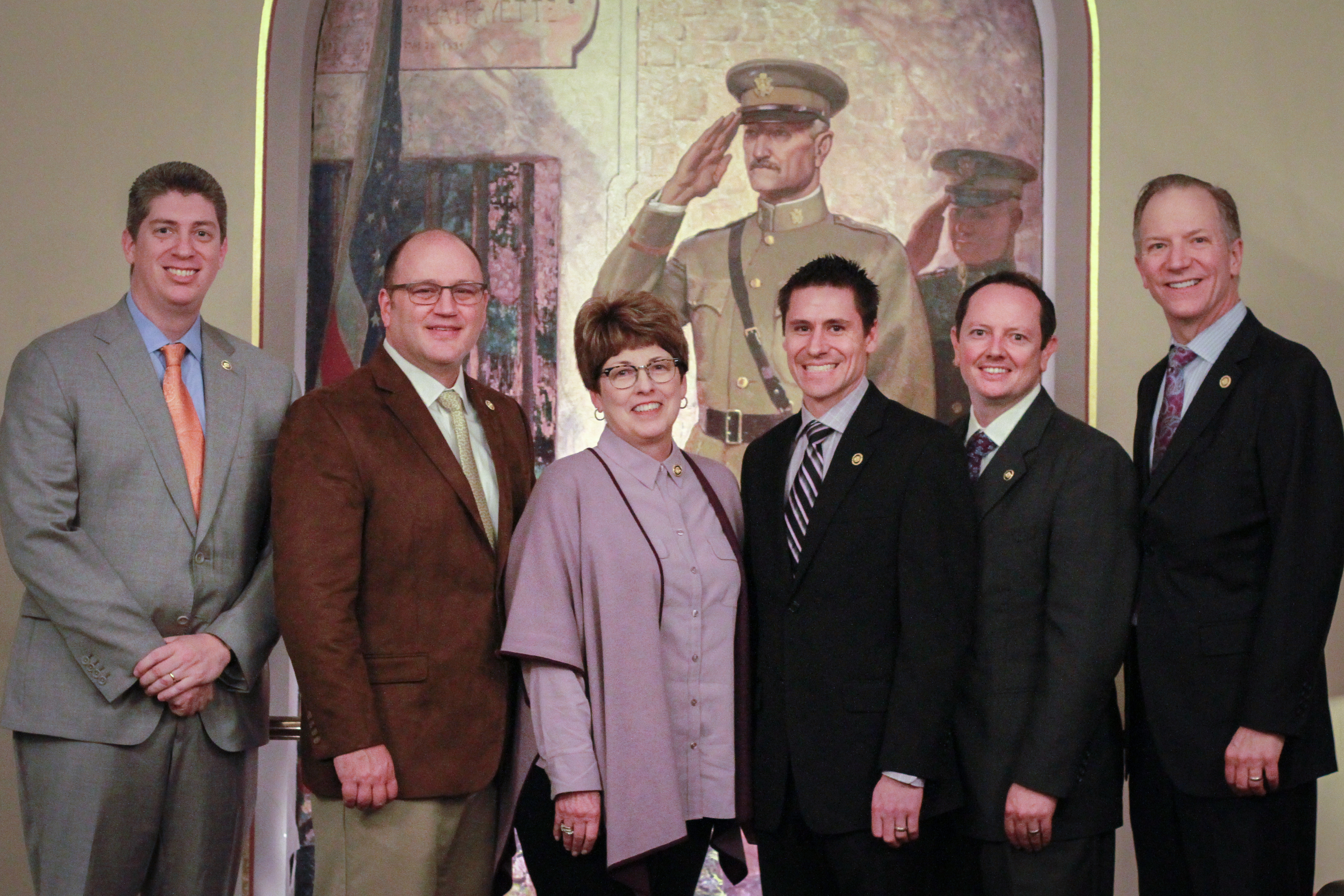
“We’ve been looking for a connection to the Fast Track bill to the General Motors program for the past several days and haven’t found a single one. We’ve reached out to General Motors and did not get the sense Fast Track is critical to their bid process,” Eigel said. “At this point, I don’t see how they connect.”
“I certainly understand Fast Track is part of the governor’s agenda, and … we’ll continue having that discussion. We’re still working with the governor, and he’s been great in terms of reaching out to us and getting our input on how to make the Fast Track bill better,” he said. “But we just haven’t gotten there to fruition. I think we can put a competitive offer on the table for GM that actually doesn’t expand any of our programs beyond what we already have.”
During Koenig’s initial Fast Track filibuster, the Republican who represents parts of St. Louis County decried a perceived lack of compromise among his colleagues. He specifically pointed to a March filibuster — led by Romine and Sen. Doug Libla, also a Republican — against his bill establishing a tax credit scholarship.
On Tuesday, Koenig said he attempted to compromise with his ESA bill — by adding Fast Track language and tweaking ESAs to include more accountability measures, shrinking the scope of the program, and adding geographical restrictions.
“He’s been open to compromise; his door has always been open,” Sen. Denny Hoskins, a Conservative Caucus member, previously said. “However, sometimes I feel like Sen. Koenig has gotten the runaround, and so we definitely want to see ESAs on this Fast Track bill.”

Kaitlyn Schallhorn was the editor in chief of The Missouri Times from 2020-2022. She joined the newspaper in early 2019 after working as a reporter for Fox News in New York City.
Throughout her career, Kaitlyn has covered political campaigns across the U.S., including the 2016 presidential election, and humanitarian aid efforts in Africa and the Middle East.
She is a native of Missouri who studied journalism at Winthrop University in South Carolina. She is also an alumna of the National Journalism Center in Washington, D.C.
Contact Kaitlyn at kaitlyn@themissouritimes.com.

